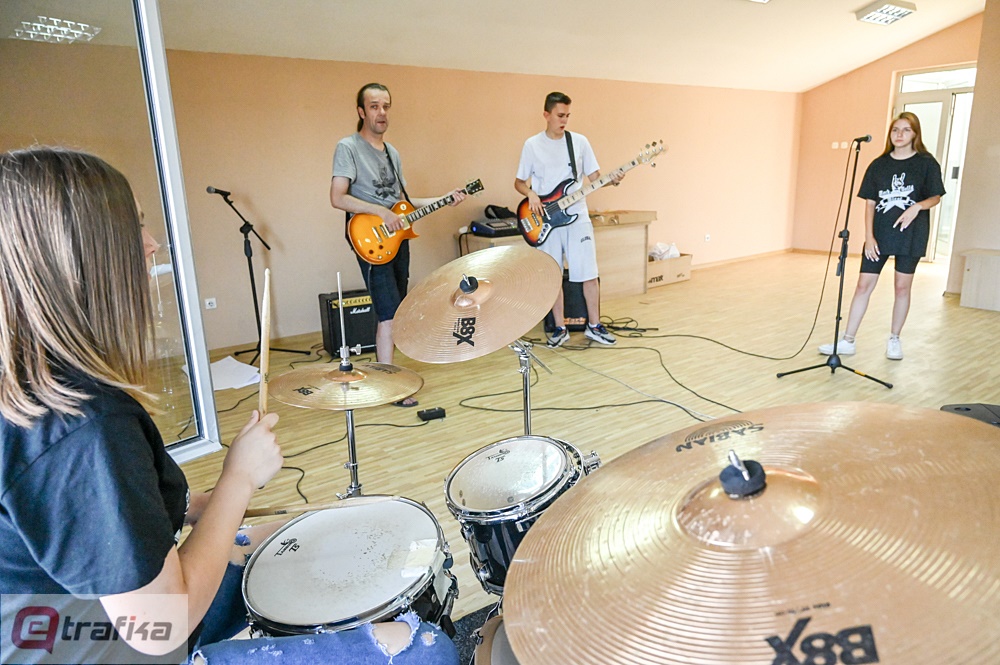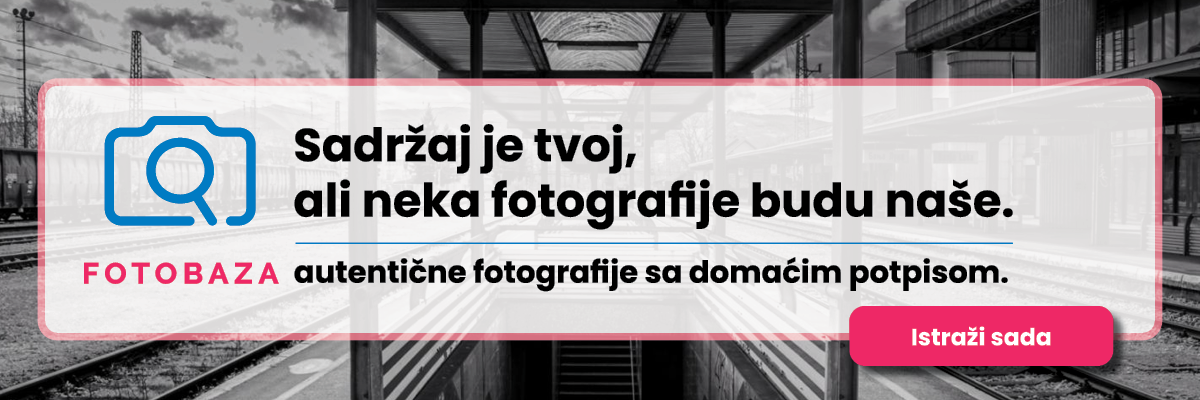It is an ordinary summer day. Usual, slow-paced life in the town of Bratunac will not allow anything to disrupt it. But everything is different in the improvised music rehearsal studio in the town centre. There is one man and about ten teenagers, who are tuning their instruments and sending each other a signal. It is time for rock and roll
Written by: Vanja Stokic, Photograph and video taken by: Ajdin Kamber
Their story began right before the pandemic outbreak. The Civic Association “Friends of Srebrenica” decided to offer young people from neighbouring municipalities an opportunity to have quality leisure time. With the help of donors they purchased equipment and rented a mini-van for those living far from Bratunac who wished to join them. They hired teachers and found suitable premises. The Rock School commenced its work.
“At first we rehearsed separately, thanks to having enough space. So we separated guitarists, drummers, keyboardists and singers. They practiced with each of the teachers individually. We had teachers for keyboards and for guitar, for bass guitar and drums, and in the end of the teaching cycle we would record a set of songs and post the video on You Tube. It was a success story for some two years. We had around 30 attendees, cannot tell you the exact number” says Dragoslav Sarac, bass guitar teacher at the Rock School.
When the project was officially finished, they took a break. Some attendees pursued studies in other towns. There was no money to continue engaging teachers, or to provide the transport for these young people. It was then that we started facing difficulties, and we still do.
“I am the only teacher who stayed as a volunteer. We tried to keep the School running in whichever way just to maintain its continuity, so that the Rock School would not have to close down. Now when we have all necessary equipment it would really be a pity to have it closed down. So we somehow continued. We recently performed at the “Freedom to People” Festival in Sarajevo. We also performed at the celebration of the Anniversary of BaH accession to the United Nations. Regardless of the fact that we are not operating with full capacity, we are still being invited to play at some gigs, which we accept and go to perform”, Dragoslav tells us.
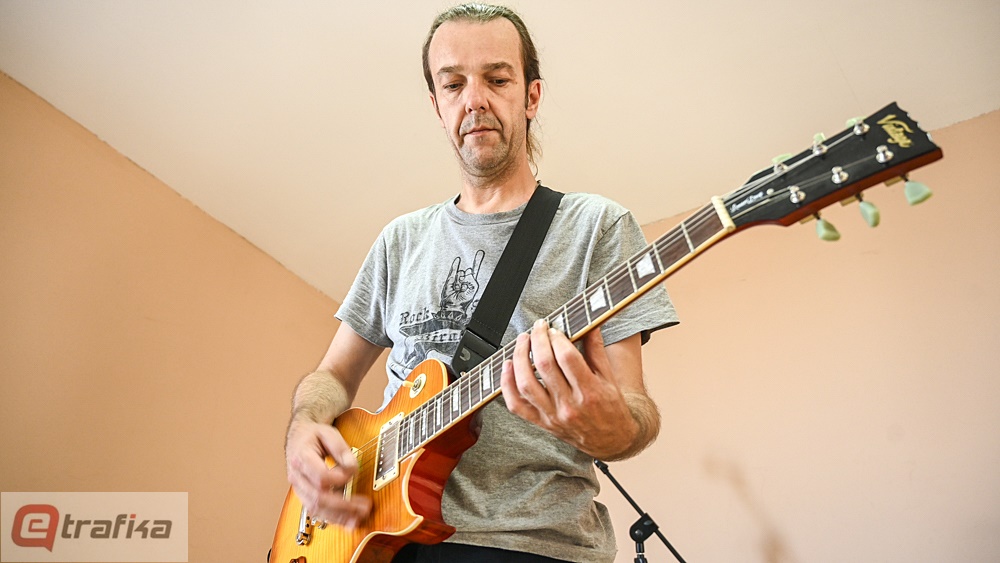
At the moment, the School has ten young people who do not wish to stop playing and singing, and because of whom Dragoslav is determined not to give up the Rock School. They are keeping each other here.
“I am truly motivated by all those kids who are here. If they didn’t care they certainly wouldn’t be in this School. Given that there are no special cultural activities here, no events, this is quite interesting for them. They hang out together, play in public, and when we are to participate at some festival, we organise it like a little excursion. We don’t have enough time now or premises, and unfortunately we can’t provide transport for them all. But then we organise ourselves, I pick them up by my car, drive them to a rehearsal, and then back home. It is good to see them socialize with each other, and to have them learn something new. I am happy to see that they want to learn and that is what motivates me the most, their eagerness is my motivation”, he is talking to us, while boys and girls, young people behind us are getting ready to play.
Their guitars are new, but their strings and becoming worn out. The drums sound good, even with the worn sticks and plastics. They keep the instruments in the cardboard boxes, because they don’t have bags or cases. The keyboards crave for a new stand. But this team plays as if they had the best conditions in the world. And for them, these conditions are indeed the best.
“When the Rock School just opened I didn’t like it that much. I wasn’t listening to rock music back then. One month after the beginning of the semester, I joined the School and started to like it, because of the company but also because of the new experience”, Armina Garaljevic (14) from Potocari speaks from her heart.
She admits that she gets nervous before public performances, but that disappears as soon as she starts playing. Her place is at the drums.
“I actually wanted to play the guitar, but there were so many others who played it, and then I saw the drums, and saw that it was mostly men who were playing the drums, so I got a wish to give it a try despite being a girl. I like it because playing drums is different and because even nowadays you can’t see many women doing it. For me, the Rock School is a good way to socialize and get a new experience. Thanks to the Rock School, I decided to pursue music career in my life”, says Armina.
Osman Mehanovic (18) from Bratunac plays bass guitar. He tells us that all the members of the band help each other and learn how each instruments works, not just their major ones.
“When I first came here, I wasn’t sure which instrument to choose, and then I was recommended a bass guitar, so I tried. I really like bass guitar perhaps because Dragoslav, who has been a musician for 30 years and has been playing music all his live, is my teacher. It is the effort, dedication, continuous practice that enabled us to progress more and more, learn new songs, and get to love our instruments. We covered and played a lot of songs. Just to mention some, Seven Nation Army, Zombie, Bella Ciao…“, explains Osman in between setting up his instrument and rehearsing.
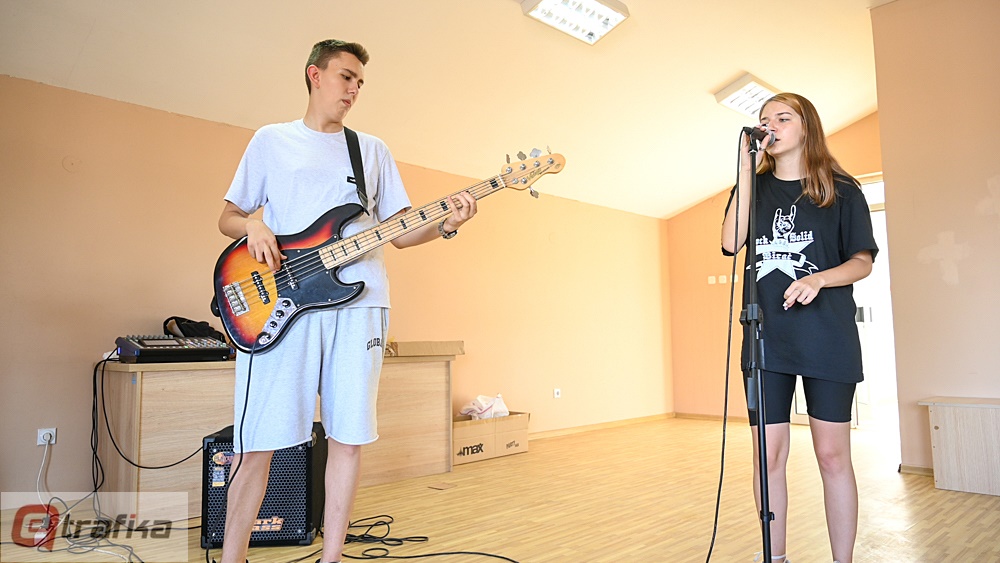
Marija Prodanovic (14) from Bratunac is at the microphone.
“I simply love to sing and I feel great when I perform. Of course, there is always some nervousness, but not to that extent that would prevent me from singing. I always do it with pleasure” she is brief, not letting go of her microphone as she speaks.
“But you see, it's not me, it's not my family. In your head, in your head they are fighting, with their tanks and their bombs. And their bombs and their guns. In your head, in your head they are crying” – as the lyrics of the Cranberries are echoing in the improvised rehearsal room in Bratunac, there are individual classes taking place in Mostar. This Rock School has been existing in this town for ten years already. Since then, from inital 16 attendees, the number increased to 177 pupils and 200 members.
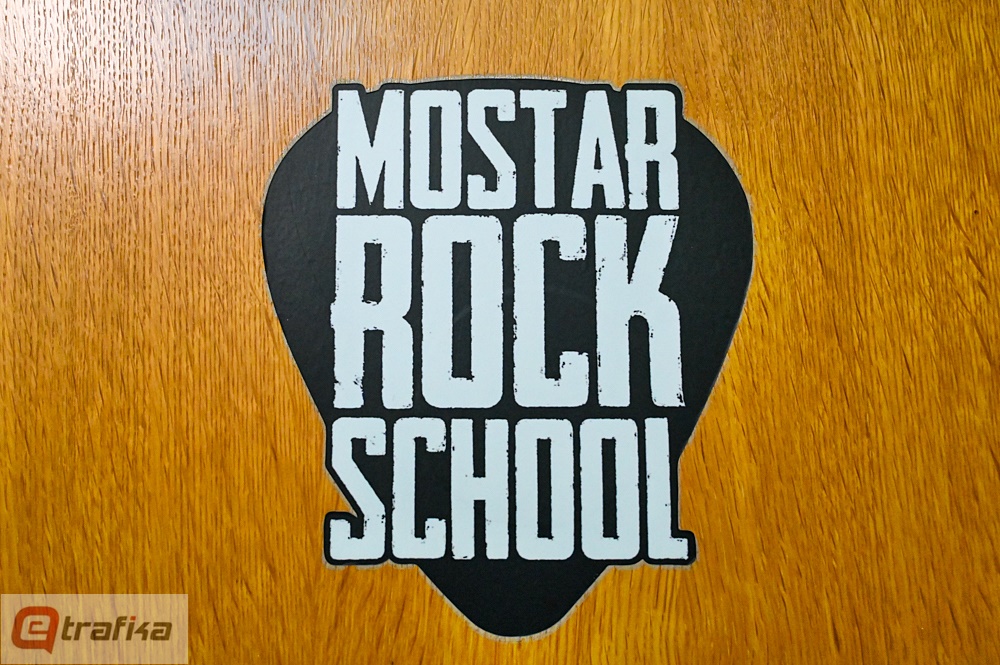
In this School, the attendees may enrol in different departments: vocal section, electric guitar, bass guitar, drums, keyboards, saxophone, creative electronic production and audio production. Both individual and group classes are mandatory. There is an interesting session band concept, with members changing every 40 days, and then preparing one original song and one cover. Every 40 days they hold concerts, at which all Rock School bands present their work to the audience.
“The Rock School aims to be a place where not only musical skills will be developed, but where everybody will be encouraged to work with different profiles of young people through session bands and group classes. In other words, young people with different psychological characteristics, some being more introverted, some more extroverted, get in touch with each other and adjust to each other. That is how we are trying to develop a team spirit here, a team work, but at the same time certain skills such as being organised and responsible. Skills that they will need not only on their musical journey, but on their life path too, and in any working environment” says Marija Raspudic from the Rock School.
There is a bass guitar class in progress, attended by Ljupko Kolak (25) from Vitez. He has been attending the Rock School for four years.
“I have a friend who has moved to Zagreb, and she tells me that there is no such a place there which promotes young musicians. Although it is hard to believe, Mostar is a better place and this town supports young musicians more than Zagreb. That is quite interesting” he says.
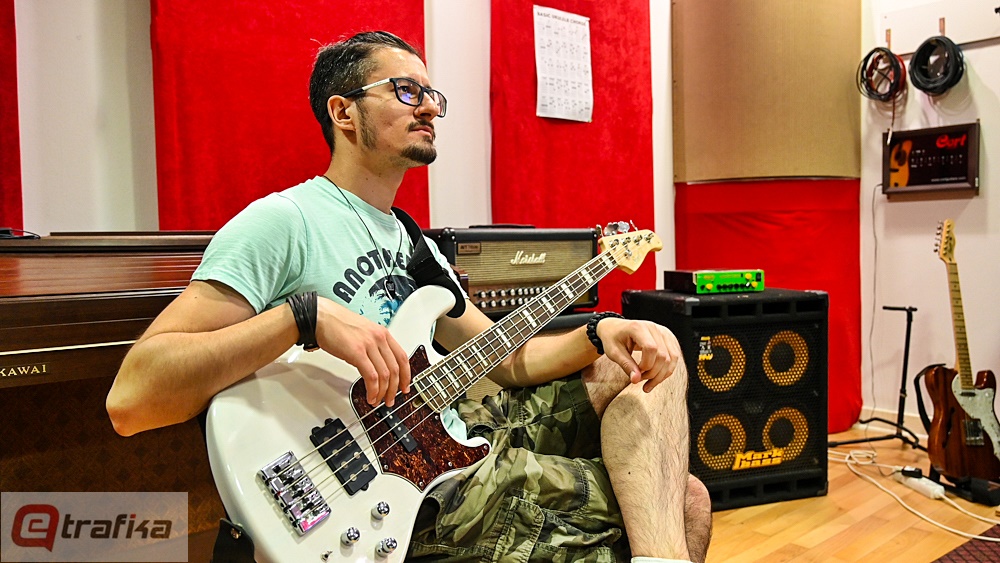
Apart from enabling them to acquire musical skills, the Rock School also teaches its students other important lessons, although it is not its primary focus.
“We are not asking our attendees to fill out some administrative forms where they would have to highlight their national orientation or the like. Our main vision is not about bringing people of different identities together, however, we strongly strive to be a place that is open to everyone. Everyone is welcome, regardless of his or her identity, or orientation of any kind. It is only important that such a person has good intentions, that he/she wants to study, that he/she wants to work and contribute to the cultural life and social community in which he/she lives. And this bonding of people happens on their own initiative, young people get to know each other, they hang out, they form their own bands and in such a relaxed, healthy environment they start to change themselves and their community for the better” Marija explains the processes which are accompanying the creation of music.
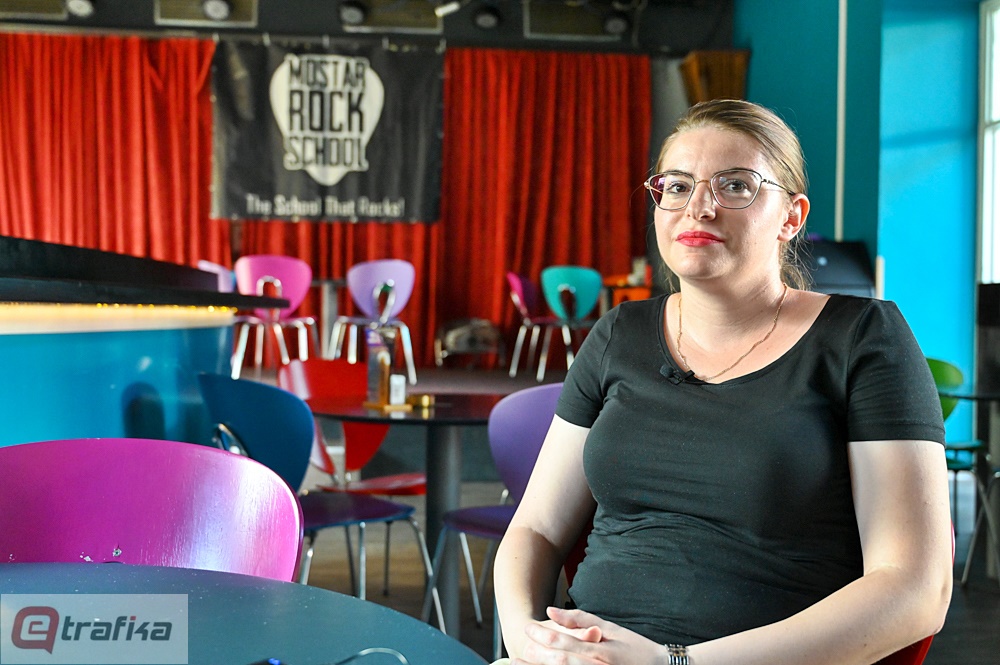
Music has always been a good ally in connecting people, overcoming obstacles and building bridges. In accepting different identities. In realizing that being different does not have to be necessarily bad, but just different from what we are used to.
“Both music and art can always be viewed as a tool, and if music is a tool we can then discuss its use or possible misuse. It can be the case, both of these instances. By travelling locally, regionally, or internationally, every time when there is a gig, a gig gathering young and relaxed people, I simply forget all negative effects that music and art can have on people. Not once did it happen that in a group of unknown people we would get close to each other through music and through art, to such an extent that we would establish connections that would last for years” says psychologist and guitarist from Banja Luka, Ognjen Tadic.
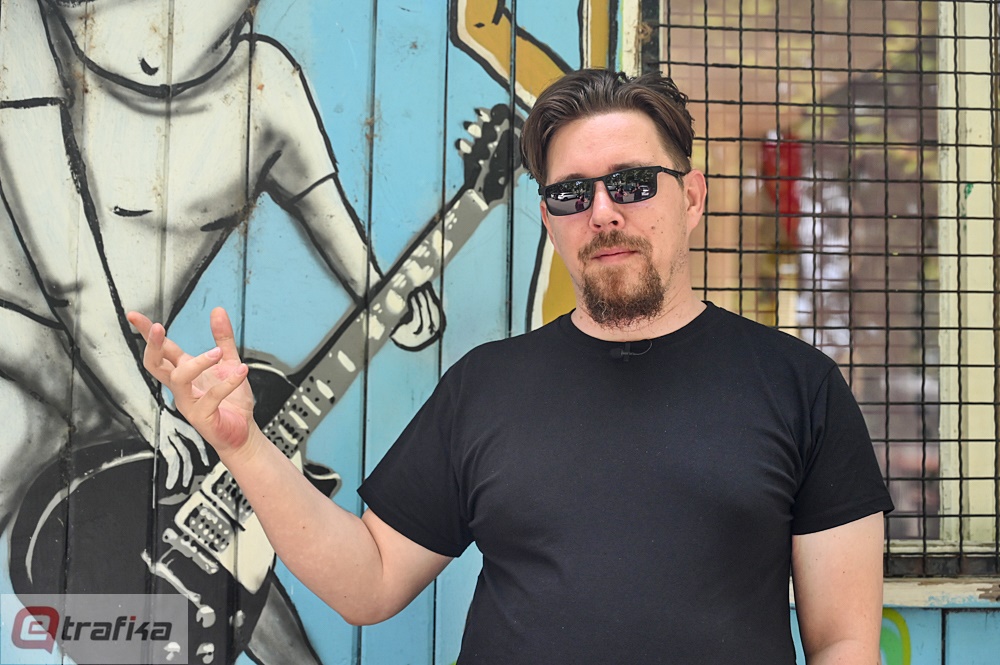
By participating in different international projects, he got a chance to see how young people experienced cultural shocks and creative processes.
“It is interesting to watch them, be a part of and a witness to different cultural exchanges, because that is where the development tolerance to differences lies. It is inevitable that we will experience something that has been collectively assigned to us. Whether these are basic needs or understanding or some complex issues, as Konstrakta would say “We consider the phenomena of contemporary society”, he explains.
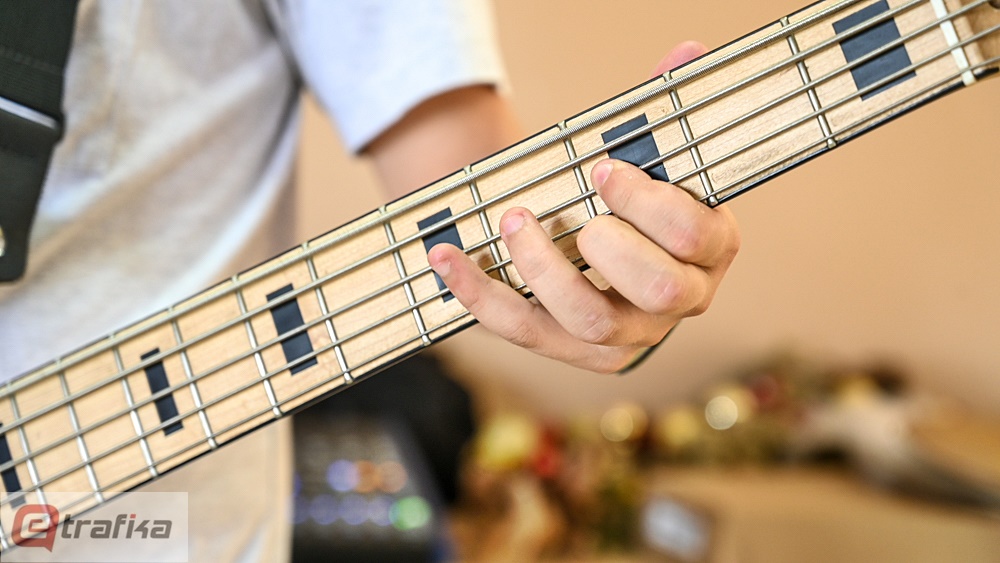
As an example of how music affects us, he mentions a simple aspect of a conference he has once attended. It is about karaoke.
“The karaoke evening was an unavoidable part of the conference, which lasted for four days. And it had to happen. People came and sang the songs of their choice, and it was an event which everyone was gladly waiting for after four days long discussion about very serious topics, child issues and future … And then we had a moment where we could satisfy our need to relax. Bond with each other, sing, dance, play. The memories of that conference are very dear to me, because it was a regional one, and it allowed us to express that well known feeling- “Let’s sing, dance, let’s rejoice in all our differences and similarities” he recalls.
Although it is not the main goal or the vision of these two Rock Schools, they contribute to the building of strong relationships between their pupils. These Schools enable their pupils to meet people with many different characteristics that they have only perhaps heard of before. It helps them establish new contacts and have new personal experience. It enables identities to be accepted and differences to be reduced.



